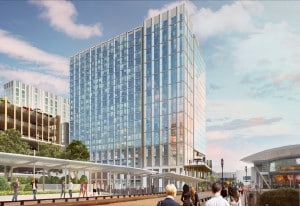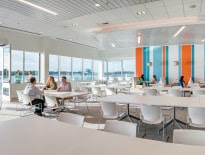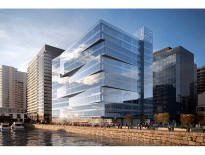
Construction of the 1,054-room Omni Seaport Boston hotel is expected to make Boston more attractive to business conventions and bolster the argument for expansion of the Boston Convention and Exhibition Center.
A development pipeline that could add more than 2,000 hotel rooms to the Seaport District in the next few years is likely to add momentum to the debate over expansion of the 70-acre Boston Convention and Exhibition Center campus.
The Massachusetts Convention Center Authority received seven responses to an August request for proposals to study expanding the 2.1-million-square-foot facility and how to pay for it. Gov. Charlie Baker put a $1 billion expansion proposal on hold in 2015 and asked the MCCA board to do an updated study of convention market conditions.
The MCCA is in negotiations with a design team that was selected as finalist. A vote whether to approve a feasibility study contract could come in mid-February, said David Gibbons, executive director of the MCCA.
Seaport developers have completed more than 500 hotel rooms in the last six years. But hotel operators have been reluctant to set aside room blocks for convention business – often sought years in advance – because of the existing strong market for business travel.
“Very sophisticated meeting planners decide which cities their group business goes to, and we’re losing to other cities right now,” said Brian Fallon, director of development for The Davis Cos. The Boston-based developer is part of a team selected by Massport to build a 1,054-room Omni Seaport Boston hotel at 440 Summer St.
The consortium, New Boston Hospitality, is negotiating a ground lease with property owner Massport for the hotel expected to begin construction this spring and open in late 2020, Fallon said. The project’s underwriting was completed prior to recent corporate relocations to the neighborhood that have boosted demand from business travelers, and the financing climate for hotel construction remains strong, Fallon said.
“It’s a unique situation having demand generators all around and corporate headquarters moving to the Seaport practically by the week,” he said.
Minority Participation Tops Requirement
The team surpassed Massport’s requirement that 25 percent of the design team include women- and minority-owned firms, including Boston-based architects Stull and Lee. Construction manager John Moriarty & Assoc. has formed a 70-30 joint venture with Boston-based Janey Construction designed to maximize the role of minority-owned subcontractors and suppliers to the $552 million project, Fallon said. And 39 members of the local minority community contributed $7 million in equity.
Meeting planners prefer cities with hotel room blocks within a half-mile walk of a convention center for convenience and to minimize transportation costs, Gibbons said. Another common requirement: large ballrooms and meeting rooms to host convention-related events off-site, something many of the existing limited-service hotels lack. The Omni hotel will include more than 100,000 square feet of meeting and ballroom space.
A 2016 study predicted BCEC bookings could decline up to 41 percent through 2021 because of meeting planners’ difficulties assembling room blocks near the convention hall. But the Omni project and potential for a 500,000-square-foot hotel a short walk down Summer Street could change the equation.
The latter site, part of Newton-based WS Development’s 12.5-acre Seaport District portfolio, is well-situated for another large convention center hotel, Gibbons said. WS has not announced a timetable or specific location for the hotel component, but Gibbons said he’s pitched WS’s parcel N bordering the Summer Street overpass for a large hotel.
“Parcel N is halfway between (the BCEC) and South Station, and that’s a beautiful site for a hotel,” he said. “The bigger, the better from our point of view and we’ve voiced that opinion to them.”
WS Development could not be reached for comment.
Room Rates Leveled Off In 2017
The continuing hotel development boom comes after a largely flat year for the local lodging industry’s financial performance.
Seaport District hotels had an occupancy rate of 77 percent in 2017, unchanged from the previous year, according to data from Boston-based hospitality industry consultants Pinnacle Advisory Group. Average daily room rates were $257, up from $255 in 2016, and room inventory increased by 9 percent with the opening of the 326-room Yotel, said Sebastian Collella, a Pinnacle vice president.
Two other hotel development teams are moving ahead with projects designed to attract business and leisure travelers, but not specifically conventioneers.
Wellesley-based Harbinger Development added Intercontinental Real Estate Corp. as a partner on its 15-story Marine Wharf hotel at 660 Summer St., which expected to break ground this spring after it secures a construction loan, Intercontinental CEO Peter Palandjian said.
The dual-branded property will include 245 rooms under the limited-service Hampton Inn brand and 166 extended-stay Homewood Suites. The hotel hasn’t committed to any room block set-asides with the MCCA, anticipating strong demand both from business and leisure travelers, Palandjian said.
Hyatt Hotel Corp. and Denver-based McWhinney Real Estate Services are partnering on a 293-room hotel at 315 Northern Ave., a parking lot owned by Massport that also will include a 304-unit apartment complex. MCCA has met with the developers but not received a commitment for room blocks, Gibbons said.




 |
| 




